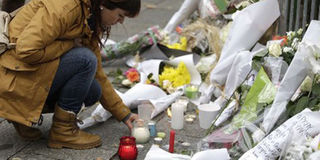The war on terrorism cannot be won unless world addresses its root causes

A woman lights a candle at a rail cordon close to the Bataclan theatre in the 11th district of Paris on November 14, 2015, the day after a series of attack on the city resulting in the deaths of more than 128 individuals. The gruesome terrorist attacks in Paris have left the world shaken. PHOTO | AFP
What you need to know:
- The Islamic State in Iraq and Syria came out looking like a barbaric, evil, crazy, and inhuman outfit, just the way Al-Shabaab did when it attacked the Westgate mall, and especially after it killed more than 140 students at Garissa University College.
- Pearson was particularly critical of the media, whose “hierarchy of tragedy reflects and perpetuates a political hierarchy in which some lives supposedly matter more”.
The gruesome terrorist attacks in Paris have left the world shaken.
Not only were the attacks carried out with the precision of a surgeon, they occurred in one of the world’s most loved and safest cities.
The outpouring of sympathy for Parisians and the French people was palpable around the world.
The Islamic State in Iraq and Syria came out looking like a barbaric, evil, crazy, and inhuman outfit, just the way Al-Shabaab did when it attacked the Westgate mall, and especially after it killed more than 140 students at Garissa University College.
How much hatred can an organisation’s members harbour?
What evil sits in their hearts as they plot the murders of innocent men, women, and children?
What bit about Islam, a religion of peace, do they fail to comprehend?
These are questions we are all asking, but their answers are neither straightforward nor easy to compartmentalise.
In today’s world, where short text and Twitter messages reduce complex issues to clichés, it is easy to paint people as either good or evil because that is how the media and politicians portray them.
However, if we are to tackle this terrorism menace once and for all, there needs to be some truth-telling, historical perspective and a genuine desire to get to the heart of the Isis beast which, like the fictional monster Frankenstein, has gone rogue and is devouring its creator.
THE ENEMY WITHIN
To achieve this, we must acknowledge that terrorist organisations do not grow spontaneously — they are often a product of real or perceived injustices and humiliations and are borne out of a sense of desperation and despair.
And they are often supplied with arms by the very forces that claim to be fighting them.
We have seen how misguided military interventions fuelled conflict in the Middle East and created generations of angry youth who could easily be manipulated by shrewd and deceptive online propagandists and power-hungry clerics.
There are now new reports that show that the United States, Saudi Arabia, Turkey, and Qatar inadvertently, or perhaps deliberately, supplied arms to Isis- and Al-Qaeda-linked groups in Iraq and Syria.
If the latter is indeed true, then the so-called war against Isis is not just misguided, it is sinister.
The day after the Paris attack, reflecting on violence, injustice, and militarisation and what it does to societies, blogger Chris Floyd, a columnist for the US-based The Nation online magazine, wrote: “We, the West, overthrew Saddam by violence. We overthrew Gaddafi by violence. We are trying to overthrow Assad by violence. Harsh regimes all — but far less draconian than our Saudi allies, and other tyrannies around the world… Without the American crime of aggressive war against Iraq — which, by the measurements used by Western governments themselves, left more than a million innocent people dead — there would be no Isis, no ‘Al Qaeda in Iraq’.”
Tamara Pearson, also writing in The Nation, asked a question which also many Kenyans have been asking: Why did the Paris attack elicit so much worldwide sympathy from heads of state and ordinary folk when terrorist acts that have killed more people in places such as Beirut, Syria, Palestine, Nigeria, Somalia, and Kenya did not?
THE SOLUTION
Pearson was particularly critical of the media, whose “hierarchy of tragedy reflects and perpetuates a political hierarchy in which some lives supposedly matter more”.
She argued that “by selectively using tragedy, sensationalising it for click kudos and therefore trivialising it, even the reported deaths fall silent because they are not really understood”.
In the hierarchy of tragedies, injustices such as forced displacement, extra-judicial killings, marginalisation, racism, and sexism become non-events.
What is worse, no one asks how they came about.
They are treated as normal and natural phenomena.
It is assumed that the solution to these injustices lies not in eradicating them, but in alleviating the victims’ suffering — by offering them a dollar or a plate of rice.
Unfortunately, the Paris attack will lead to more racism, more Islamophobia, and more suffering.
The Syrian and other refugees — products of the West and its allies’ military and foreign policy interventions — will no longer be welcome as more walls are built and more restrictions are placed to prevent them from seeking refuge in the very countries that created or fuelled the crisis they now face.





